Would rather的用法汇总
would rather 用法归纳

would rather 用法归纳“would rather+动词本相”是英语中罕有的一个习用句式.would在此决无“曩昔”之意,且无词性.时态变更.该句式经常应用来暗示选择的意愿,意谓“宁可……”.“情愿……”.例如:(1) He would rather work in the countryside.她宁可到农村去工作.(2) If you would rather be alone, we’ll all leave here.假如你情愿独自呆着,那我们都分开这儿.would rather与than连用,可组成另一个习用句式,即:“would rather...than....”,意谓“宁可(愿)……(而)不要(愿)……”.“与其……不如……”.用以表达主语的意愿,强调经由选择后做个中一件事,而不肯做另一件事.例如:(4) I would rather watch TV at home than go to the cinema.我宁可在家看电视而不肯去看片子.(5) The children would rather walk there than take a bus.孩子们情愿步行去那边而不乘公共汽车.在应用“would rather...than...”句型时,应留意以下几点:1. than后边也应接动词本相(见句(4)和(5)),但如该句型前后衔接的两个动词雷同,则 than之后的谁人动词可省去.如:(6) I’d rather you know that now than (know) afterwards.我宁可你如今就知道这件事,而不是今后.3.有时,为暗示语气上的强调,可将rather than置于句首,如:(7) Rather than refuse to help you, I would borrow money from my friends.试比较I would borrow money from my friends rather than refuse to help you.我宁可向同伙借钱,也不肯谢绝帮忙你.4. would rather后还可接动词的完成式,暗示主语要做某事,而成果事与愿违的意思.如:(8) I would rather have left a note on her desk.我本想留张字条在她书桌上的.(事实上没有留)试比较(9) I’d rather I left a note on her desk.我宁可留张字条在她的书桌上.。
would rather用法
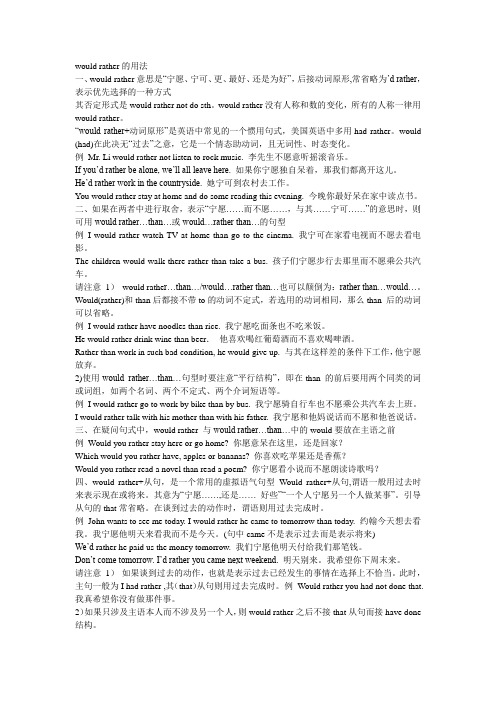
would rather的用法一、would rather意思是“宁愿、宁可、更、最好、还是为好”,后接动词原形,常省略为’d rather,表示优先选择的一种方式其否定形式是would rather not do sth。
would rather没有人称和数的变化,所有的人称一律用would rather。
“would rather+动词原形”是英语中常见的一个惯用句式,美国英语中多用had rather。
would (had)在此决无“过去”之意,它是一个情态助动词,且无词性、时态变化。
例Mr. Li would rather not listen to rock music. 李先生不愿意听摇滚音乐。
If you’d rather be alone, we’ll all leave here. 如果你宁愿独自呆着,那我们都离开这儿。
He’d rather work in the countryside. 她宁可到农村去工作。
You would rather stay at home and do some reading this evening. 今晚你最好呆在家中读点书。
二、如果在两者中进行取舍,表示“宁愿……而不愿……,与其……宁可……”的意思时,则可用would rather…than…或would…rather than…的句型例I would rather watch TV at home than go to the cinema. 我宁可在家看电视而不愿去看电影。
The children would walk there rather than take a bus. 孩子们宁愿步行去那里而不愿乘公共汽车。
请注意1)would rathe r…than…/would…rather than…也可以颠倒为:rather than…would…。
Would(rather)和than后都接不带to的动词不定式,若选用的动词相同,那么than 后的动词可以省略。
Would rather 用法小结

Would rather 用法小结文/郭李强一、would rather意思是“宁愿、宁可、更、最好、还是为好”,后接动词原形,常省略为’d rather,表示优先选择的一种方式其否定形式是would rather not do sth. would rather没有人称和数的变化,所有的人称一律用would rather.“would rather+动词原形”是英语中常见的一个惯用句式,美国英语中多用had rather。
would (had)在此决无“过去”之意,它是一个情态助动词,且无词性、时态变化。
例:Mr. Li would rather not listen to rock music. 李先生不愿意听摇滚音乐。
Sh e’d rather work in the countryside. 她宁可到农村去工作。
二、如果在两者中进行取舍,表示“宁愿……而不愿……,与其……宁可……”的意思时,则可用would rather…than…或would…rather than…的句型例: I would rather watch TV at home than go to the cinema.我宁可在家看电视而不愿去看电影。
请注意:1) would rather…than…/would…rather than…也可以颠倒为:rather than…would…。
Would(rather)和than后都接不带to的动词不定式,若选用的动词相同,那么than 后的动词可以省略。
例:He would rather drink tea than coffee.他喜欢喝茶而不喜欢咖啡。
Rather than work in such bad condition, he would give up. 与其在这样差的条件下工作,他宁愿放弃。
2)使用would rather…than…句型时要注意“平行结构”,即在than 的前后要用两个同类的词或词组,如两个名词、两个不定式、两个介词短语等。
would rather的重要句型

一、后接动词原形(would rather do sth)
表示“宁愿做某事”。
eg:
• I'd rather be told the truth than be lied to. 我宁愿听真话,不愿被欺 骗。 • I've already seen that film, so I'd rather see another one. 我已经看过 那部电影了,所以还是看部别的吧。 • I'll go if you're going. If not, I'd rather stay at home. 你去我就去,否 则我宁可待在家里。
• I'd rather do it without anybody's help. 我宁愿不要任何人帮助,自 己干这件事。 • “How about a drink?” “I'd rather have something to eat.”“喝 一杯怎么样?”“我宁愿来点吃的。”
• 注:would rather的否定式,通常要将not置于rather之后。如: • I'd rather not say anything. 我宁可什么也不说。
二、后接完成式动词
后接完成式动词,(would rather have done)表示过去的想法,通常 可译为“(本来)宁愿做某事”。 • We went by sea, but I' d rather have gone by air. 我们是乘船去的, 可我本想乘飞机去。 • “At that time, I would rather have been a factory worker than an animal keeper,” he said. “那时,我宁愿做一个工厂工人,也不 愿做动物饲养员,”他说道。
would rather的虚拟语气用法

would rather的虚拟语气用法Would rather是一个非常常见的英语短语,意为“宁愿……”,是虚拟语气的一种用法。
在日常生活中,我们经常用would rather表达自己的喜好或选择,有时也会用它来表示期望或建议。
本文将会详细讲解would rather的用法,帮助大家更好地理解和使用这一短语。
1. would rather的基本结构Would rather的基本结构是would rather + 动词原型。
例如:- I would rather stay at home than go out. 我宁愿呆在家里也不出去。
- Would you rather have a glass of water or a cup of coffee? 你喜欢喝一杯水还是一杯咖啡?- He would rather play basketball than watch TV. 他宁愿打篮球也不看电视。
2. 表示现在或将来的虚拟Would rather可以用来表达对现在或将来的假设或期望。
这种用法通常是由if引导的条件句,其谓语动词要使用虚拟语气(即be动词用were,其他动词用动词原型)。
例如:- If I had more money, I would rather buy a car than take the bus. 如果我有更多的钱,我宁愿买辆车也不坐公交。
- If it doesn't rain tomorrow, we would rather have a picnic than stay indoors. 如果明天不下雨,我们宁愿野餐也不呆在室内。
3. 表示过去的虚拟在过去式的句子中,would rather常常用来表达说话人过去的偏好或选择,通常是用had rather的过去时态,had与rather之间用not连接。
例如:- I had rather not eat seafood when I was younger. 我小时候不太喜欢吃海鲜。
would-rather的详细用法.doc

would-rather的详细用法.docwould-rather 是英语中常用的一个表达方式,通常翻译为“宁愿”,用来表达在两个或多个选择中,更倾向于选择哪一个。
本文将详细介绍 would-rather 的用法,帮助学习者更好地理解和运用这个表达方式。
一、基本构成would-rather 通常由 would 和 rather 两部分组成,其中 would 表达某种情态,通常情况下翻译为“愿意”或“想要”,而 rather 则用来表达更倾向于的那个选择,翻译为“宁愿”、“更喜欢”、“更想要”等。
下面是一些示例:- I would rather stay at home than go out tonight.(今晚我宁愿呆在家里,也不想出去。
)- Would you rather go to the beach or go hiking?(你更愿意去海滩还是去远足?)- She would rather sleep in than get up early on the weekend.(她宁愿在周末睡懒觉,也不愿早起。
)二、用法1. 表达对两个选择的偏好Would-rather 的最常见用法是用来表达对于两个选择中更倾向于的那一个。
无论是表达自己的想法,还是询问对方的意见,都可以使用 would-rather。
一些例句如下:2. 表达对于某种情况的偏好除了用来表达对于两个选项的比较,would-rather 还可以用来表达对于某种情况的偏好。
例如:- I would rather read a book than watch TV.(我更喜欢看书,不愿意看电视。
)- He would rather eat pizza than Chinese food.(他更爱吃披萨,不愿意吃中餐。
)三、其他注意事项在 would-rather 的句子中,通常是将 would 放在主语之后,然后加 rather,然后在后面跟上选择。
英语词组wouldrather用法最全

英语词组wouldrather用法最全词组would rather的用法1. 表示“宁愿做某事”:(非虚拟语气)记住两个常用的重要的词组:would rather do sthwould rather do sth than do sth= prefer to do rather than do sth例句1:I’d rather stay single to study all my life.我宁愿一辈子不嫁人,也要学医。
例句2:I would rather live an independent life than rely on my parents.= I prefer to live an independent life rather than rely on my parents.我宁愿独立生活也不想依靠我的父母。
2. would rather 表示虚拟语气:would rather 后接从句时,若表示与现在或将来情况相反,从句用一般过去时;若表示与过去情况相反,从句用过去完成时。
例句1:I would rather I worked in a smaller company now.我宁愿现在在一个小公司就职。
(对现在的虚拟)例句2:I’d rather I had gone to the theatre than stayed at home last night.= I’d rather have gone to the theatre than stayed at home last night.我宁愿昨天晚上去看电影而不是呆在家里。
(对过去的虚拟)例句3:I’m not free tomorrow. I’d rather you came next weekend.我明天没空。
我宁愿你下个周末来。
(对将来的虚拟)小检测一.词的适当形式填空:1. He would rather _________(keep) time for his hobbies.2. She would rather ___________(move) to another city than _________(stay) in the present city.3. I would rather she __________(ask) me before borrowing my car.4. I’d rather you __________(pick) her up at the airport tomorrow morning.5. I’d rather you ___________(finish) your homework now. Then we can go out to play basketball.答案:1. keep 2. move, stay 3.had asked 4. picked 5. finished二.同义句转换:1. I would rather I had hired him as my secretary last year.→I would rather ________ _________ him as my secretary last year.2. I would rather go outside than stay at home doing nothing.I __________ __________ go outside rather than stay at home doing nothing.答案:1. have hired 2. prefer to。
would-rather的五个重要句型
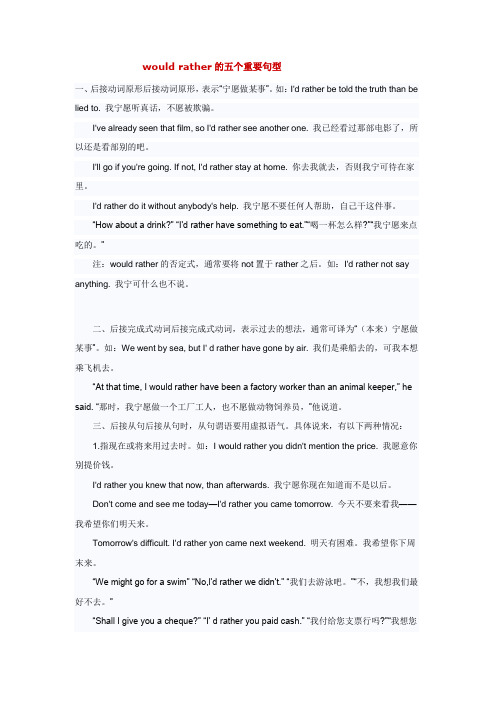
would rather的五个重要句型一、后接动词原形后接动词原形,表示“宁愿做某事”。
如:I'd rather be told the truth than be lied to. 我宁愿听真话,不愿被欺骗。
I've already seen that film, so I'd rather see another one. 我已经看过那部电影了,所以还是看部别的吧。
I'll go if you're going. If not, I'd rather stay at home. 你去我就去,否则我宁可待在家里。
I'd rather do it without anybody's help. 我宁愿不要任何人帮助,自己干这件事。
“How about a drink?” “I'd rather have something to eat.”“喝一杯怎么样?”“我宁愿来点吃的。
”注:would rather的否定式,通常要将not置于rather之后。
如:I'd rather not say anything. 我宁可什么也不说。
二、后接完成式动词后接完成式动词,表示过去的想法,通常可译为“(本来)宁愿做某事”。
如:We went by sea, but I' d rather have gone by air. 我们是乘船去的,可我本想乘飞机去。
“At that time, I would rather have been a factory worker than an animal keeper,” he said. “那时,我宁愿做一个工厂工人,也不愿做动物饲养员,”他说道。
三、后接从句后接从句时,从句谓语要用虚拟语气。
具体说来,有以下两种情况:1.指现在或将来用过去时。
如:I would rather you didn't mention the price. 我愿意你别提价钱。
英语语法:有关wouldrather的五个重要句型
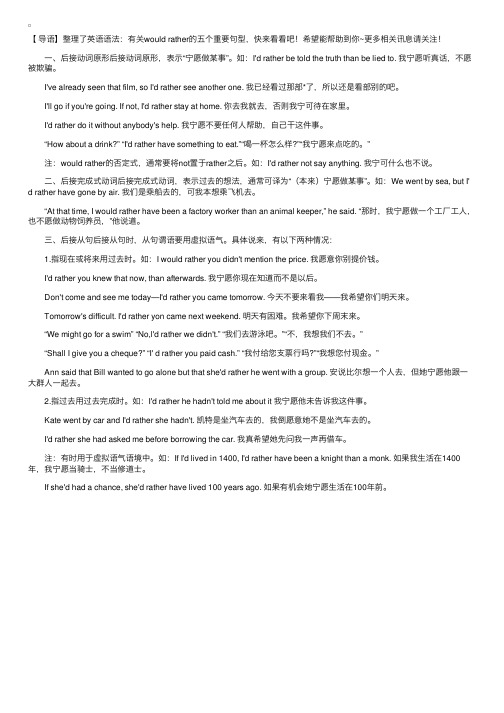
【导语】整理了英语语法:有关would rather的五个重要句型,快来看看吧!希望能帮助到你~更多相关讯息请关注! ⼀、后接动词原形后接动词原形,表⽰“宁愿做某事”。
如:I'd rather be told the truth than be lied to. 我宁愿听真话,不愿被欺骗。
I've already seen that film, so I'd rather see another one. 我已经看过那部*了,所以还是看部别的吧。
I'll go if you're going. If not, I'd rather stay at home. 你去我就去,否则我宁可待在家⾥。
I'd rather do it without anybody's help. 我宁愿不要任何⼈帮助,⾃⼰⼲这件事。
“How about a drink?” “I'd rather have something to eat.”“喝⼀杯怎么样?”“我宁愿来点吃的。
” 注:would rather的否定式,通常要将not置于rather之后。
如:I'd rather not say anything. 我宁可什么也不说。
⼆、后接完成式动词后接完成式动词,表⽰过去的想法,通常可译为“(本来)宁愿做某事”。
如:We went by sea, but I' d rather have gone by air. 我们是乘船去的,可我本想乘飞机去。
“At that time, I would rather have been a factory worker than an animal keeper,” he said. “那时,我宁愿做⼀个⼯⼚⼯⼈,也不愿做动物饲养员,”他说道。
三、后接从句后接从句时,从句谓语要⽤虚拟语⽓。
wouldrather用法大全
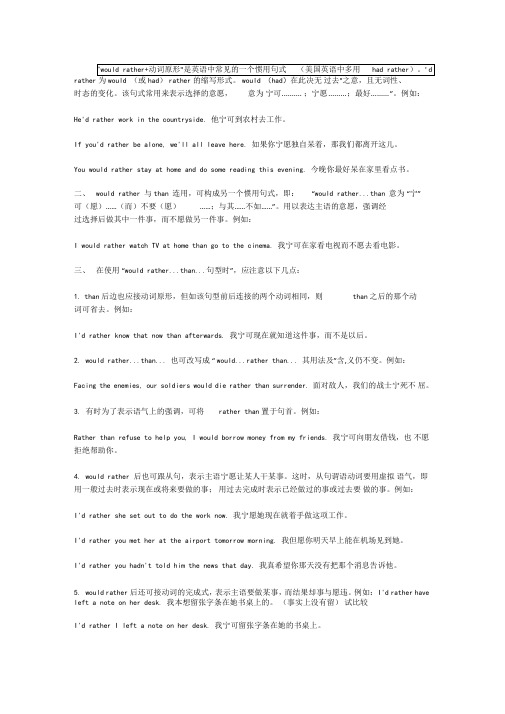
"would rather+动词原形"是英语中常见的一个惯用句式(美国英语中多用had rather)。
' d rather为would (或had)rather的缩写形式。
would (had)在此决无过去"之意,且无词性、时态的变化。
该句式常用来表示选择的意愿,意为宁可.......... ;宁愿......... ;最好......... ”。
例如:He'd rather work in the countryside. 他宁可到农村去工作。
If you'd rather be alone, we'll all leave here. 如果你宁愿独自呆着,那我们都离开这儿。
You would rather stay at home and do some reading this evening. 今晚你最好呆在家里看点书。
二、would rather 与than 连用,可构成另一个惯用句式,即:“would rather...than 意为“宁”可(愿)……(而)不要(愿)……;与其……不如……”。
用以表达主语的意愿,强调经过选择后做其中一件事,而不愿做另一件事。
例如:I would rather watch TV at home than go to the cinema. 我宁可在家看电视而不愿去看电影。
三、在使用“would rather...than...句型时”,应注意以下几点:1.than后边也应接动词原形,但如该句型前后连接的两个动词相同,则than之后的那个动词可省去。
例如:I'd rather know that now than afterwards. 我宁可现在就知道这件事,而不是以后。
2.would rather...than... 也可改写成“ would...rather than... 其用法及”含,义仍不变。
would rather的五个重要句型

一、后接动词原形后接动词原形,表示“宁愿做某事”。
如:I'd rather be told the truth than be lied to. 我宁愿听真话,不愿被欺骗。
I've already seen that film, so I'd rather see another one. 我已经看过那部电影了,所以还是看部别的吧。
I'll go if you're going. If not, I'd rather stay at home. 你去我就去,否则我宁可待在家里。
I'd rather do it without anybody's help. 我宁愿不要任何人帮助,自己干这件事。
“How about a drink?” “I'd rather have something to eat.”“喝一杯怎么样?”“我宁愿来点吃的。
”注:would rather的否定式,通常要将not置于rather之后。
如:I'd rather not say anything. 我宁可什么也不说。
奇速英语二、后接完成式动词后接完成式动词,表示过去的想法,通常可译为“(本来)宁愿做某事”。
如:We went by sea, but I' d rather have gone by air. 我们是乘船去的,可我本想乘飞机去。
“At that time, I would rather have been a factory worker than an animal keeper,” he said. “那时,我宁愿做一个工厂工人,也不愿做动物饲养员,”他说道。
三、后接从句后接从句时,从句谓语要用虚拟语气。
具体说来,有以下两种情况:1.指现在或将来用过去时。
如:I would rather you didn't mention the price. 我愿意你别提价钱。
初中英语语法wouldrather如何使用

初中英语语法wouldrather如何使用初中英语语法:英语语法大全之would rather用法一: would rather表示"宁愿"would rather dowould rather not dowould rather… than… 宁愿……而不愿。
还有would sooner, had rather, had sooner都表示"宁愿"、"宁可"的.意思。
If I have a choice, I had sooner not continue my studies at this school.I would rather stay here than go home. = I would stay here rather than go home.用法二:would rather后句子用虚拟语气would rather后接句子时,句子谓语习惯上要用虚拟语气,具体用法为:1.一般过去时表示现在或将来的愿望I’d rather y ou went tomorrow (now). 我宁愿你明天(现在)去。
I’d rather you came next Saturday. 我宁愿你下星期六来。
I’d rather you were happy. 我愿你快乐。
I’d rather she sat next to me. 我宁愿她挨着我坐。
I’d rather Jack left on an earlier train. 我宁愿杰克乘前一班火车走。
You always go without me and l’d rather you didn’t. 你总是不带我去,我可不愿意你这样。
“Shall I open the window? ” “I’d rather you didn’t. ”“我要不要把窗子打开? ” “我看不要打开好。
wouldrather的详细用法
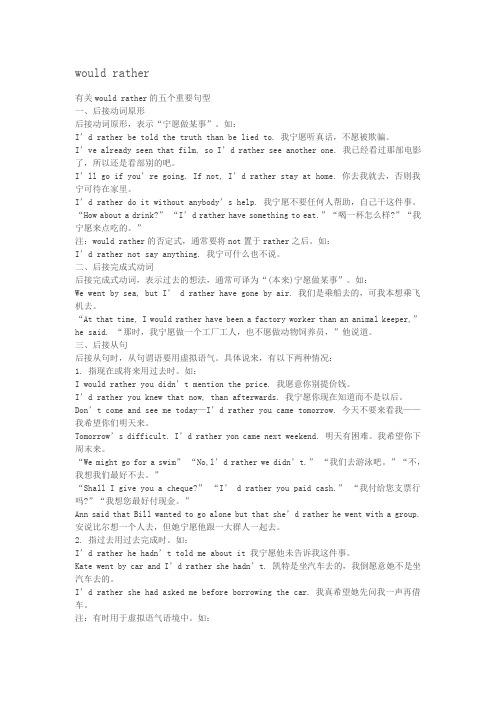
would rather有关would rather的五个重要句型一、后接动词原形后接动词原形,表示“宁愿做某事”。
如:I’d rather be told the truth than be lied to. 我宁愿听真话,不愿被欺骗。
I’ve already seen that film, so I’d rather see another one. 我已经看过那部电影了,所以还是看部别的吧。
I’ll go if you’re going. If not, I’d rather stay at home. 你去我就去,否则我宁可待在家里。
I’d rather do it without anybody’s help. 我宁愿不要任何人帮助,自己干这件事。
“How about a drink?” “I’d rather have something to eat.”“喝一杯怎么样?”“我宁愿来点吃的。
”注:would rather的否定式,通常要将not置于rather之后。
如:I’d rather not say anything. 我宁可什么也不说。
二、后接完成式动词后接完成式动词,表示过去的想法,通常可译为“(本来)宁愿做某事”。
如:We went by sea, but I’ d rather have gone by air. 我们是乘船去的,可我本想乘飞机去。
“At that time, I would rather have been a factory worker than an animal keeper,” he said. “那时,我宁愿做一个工厂工人,也不愿做动物饲养员,”他说道。
三、后接从句后接从句时,从句谓语要用虚拟语气。
具体说来,有以下两种情况:1. 指现在或将来用过去时。
如:I would rather you didn’t mention the price. 我愿意你别提价钱。
would rather的五个重要句型

would rather的五个重要句型一、后接动词原形后接动词原形,表示“宁愿做某事”。
如:I'd rather be told the truth than be lied to. 我宁愿听真话,不愿被欺骗。
I've already seen that film, so I'd rather see another one. 我已经看过那部电影了,所以还是看部别的吧。
I'll go if you're going. If not, I'd rather stay at home. 你去我就去,否则我宁可待在家里。
I'd rather do it without anybody's help. 我宁愿不要任何人帮助,自己干这件事。
“How about a drink?” “I'd rather have something to eat.”“喝一杯怎么样?”“我宁愿来点吃的。
”注:would rather的否定式,通常要将not置于rather之后。
如:I'd rather not say anything. 我宁可什么也不说。
二、后接完成式动词后接完成式动词,表示过去的想法,通常可译为“(本来)宁愿做某事”。
如:We went by sea, but I' d rather have gone by air. 我们是乘船去的,可我本想乘飞机去。
“At that time, I would rather have been a factory worker than an animal keeper,” he said. “那时,我宁愿做一个工厂工人,也不愿做动物饲养员,”他说道。
三、后接从句后接从句时,从句谓语要用虚拟语气。
具体说来,有以下两种情况:1.指现在或将来用过去时。
如:I would rather you didn't mention the price. 我愿意你别提价钱。
有关would rather的五个重要句型

有关would rather的五个重要句型一、后接动词原形would rather do…表示一种心理愿望,意思为:宁愿。
表示主语本人的愿望时,接动词原形;would rather sb…表示对他人的愿望、想法时,现在和将来的情况用过去时表示;过去的情况用过去完成时表示。
如:I’d rather do it by myself. 我宁愿独自一人去做那件事。
I’d rather you came tomorrow. 我倒想要你明天来。
I’d rather you had finished it yesterday. 我倒想你昨天就做完了I’d rather be told the truth than be lied to.我宁愿听真话,不愿被欺骗。
I’ve already seen that film, so I’d rather see another one.我已经看过那部电影了,所以还是看部别的吧。
I’ll go if you’re going. If not, I’d rather stay at home.你去我就去,否则我宁可待在家里。
I’d rather do it without anybody’s help.我宁愿不要任何人帮助,自己干这件事。
“How about a drink?” “I’d rather have something to eat.”“喝一杯怎么样?”“我宁愿来点吃的。
”注:would rather的否定式,通常要将not置于rather之后。
如:I’d rather not say anything.我宁可什么也不说。
I’d rather not tell you about it.那件事我宁愿不告诉你。
I’d rather n ot say anything. 我宁可什么也不说。
但变疑问句时,往往只将would提到句首。
如:Would you rather give the chance up? 你宁愿把机会放弃吗?Would you rather stay here or go home? 你愿意呆在这里,还是回家?Which would you rather have, apples or bananas? 你喜欢吃苹果还是香蕉?Would you rather read a novel than read a poem?你宁愿看小说而不愿朗读诗歌吗?二、后接完成式动词后接完成式动词,表示过去的想法,通常可译为“(本来)宁愿做某事”。
wouldrather的用法
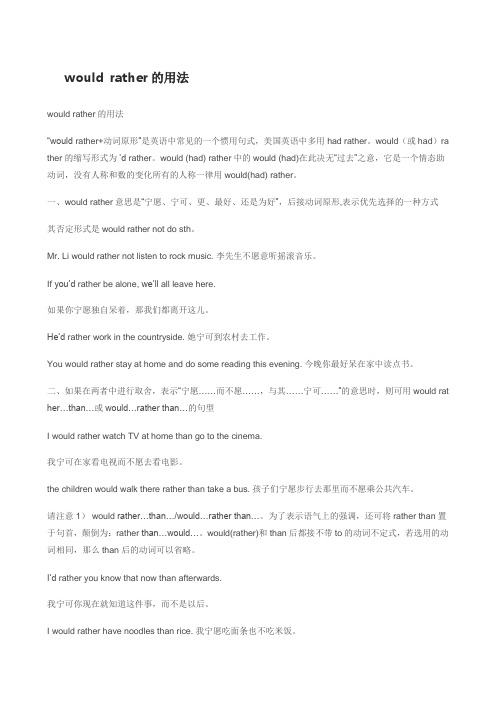
would rather的用法would rather的用法“would rather+动词原形”是英语中常见的一个惯用句式,美国英语中多用had rather。
would(或had)ra ther的缩写形式为’d rather。
would (had) rather中的would (had)在此决无“过去”之意,它是一个情态助动词,没有人称和数的变化所有的人称一律用would(had) rather。
一、would rather意思是“宁愿、宁可、更、最好、还是为好”,后接动词原形,表示优先选择的一种方式其否定形式是would rather not do sth。
Mr. Li would rather not listen to rock music. 李先生不愿意听摇滚音乐。
If you’d rather be alone, we’ll all leave here.如果你宁愿独自呆着,那我们都离开这儿。
He’d rather work in the countryside. 她宁可到农村去工作。
You would rather stay at home and do some reading this evening. 今晚你最好呆在家中读点书。
二、如果在两者中进行取舍,表示“宁愿……而不愿……,与其……宁可……”的意思时,则可用would rat her…than…或would…rather than…的句型I would rather watch TV at home than go to the cinema.我宁可在家看电视而不愿去看电影。
the children would walk there rather than take a bus. 孩子们宁愿步行去那里而不愿乘公共汽车。
请注意 1) would rather…than…/would…rather than…。
为了表示语气上的强调,还可将rather than置于句首,颠倒为:rather than…would…。
知识分享Wouldrather的正确用法
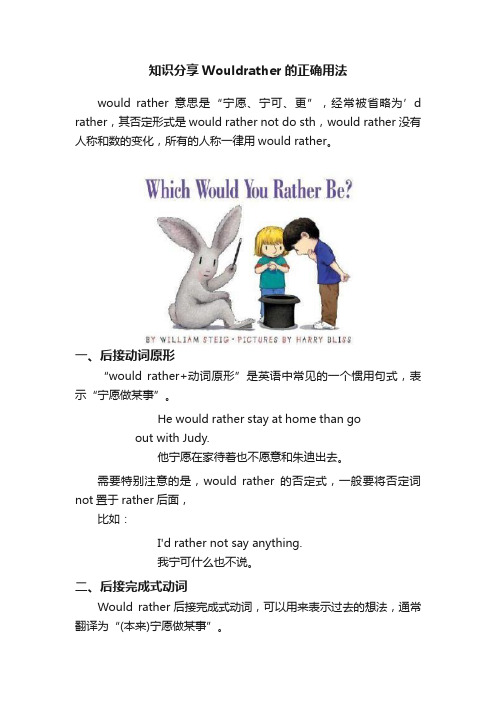
知识分享Wouldrather的正确用法would rather意思是“宁愿、宁可、更”,经常被省略为’d rather,其否定形式是would rather not do sth,would rather没有人称和数的变化,所有的人称一律用would rather。
一、后接动词原形“would rather+动词原形”是英语中常见的一个惯用句式,表示“宁愿做某事”。
He would rather stay at home than goout with Judy.他宁愿在家待着也不愿意和朱迪出去。
需要特别注意的是,would rather的否定式,一般要将否定词not置于rather后面,比如:I'd rather not say anything.我宁可什么也不说。
二、后接完成式动词Would rather后接完成式动词,可以用来表示过去的想法,通常翻译为“(本来)宁愿做某事”。
如:We went by train, but I' d rather havegone by air.我们是坐火车去的,可我本想乘飞机去。
三、后接从句Would rather后接从句时,从句谓语要用虚拟语气。
具体可分为下列两种情况:1. 指现在或将来,则用过去时如:I would rather Jason took it on我宁愿杰森来负责这件事。
“We might go for a trip” “No,l'drather we didn't.”“我们去旅行吧。
”“不,我想我们最好不去。
”2. 指过去,则用过去完成时如:I'd rather he hadn't bought it.我宁愿他从未买过这东西。
四、用于would rather…than…结构这是一个经典的英语结构,它表示“宁愿(做)……而不愿(做)……”,在初中英语阅读题中经常出现。
例句:He would rather keep silence thanadmit to his sins.他宁愿在法庭上沉默也不愿承认他的罪行。
would rather的几种用法(2018年1月7日)
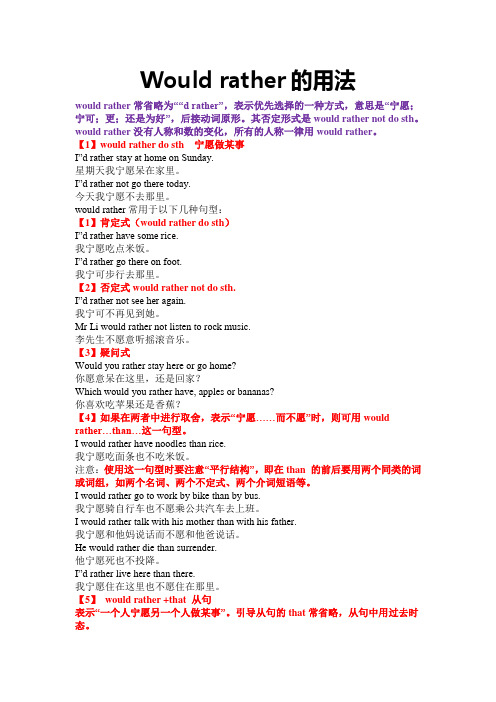
Would rather的用法would rather常省略为““d rather”,表示优先选择的一种方式,意思是“宁愿;宁可;更;还是为好”,后接动词原形。
其否定形式是would rather not do sth。
would rather没有人称和数的变化,所有的人称一律用would rather。
【1】would rather do sth 宁愿做某事I”d rather stay at home on Sunday.星期天我宁愿呆在家里。
I”d rather not go there today.今天我宁愿不去那里。
would rather常用于以下几种句型:【1】肯定式(would rather do sth)I”d rather have some rice.我宁愿吃点米饭。
I”d rather go there on foot.我宁可步行去那里。
【2】否定式would rather not do sth.I”d rather not see her again.我宁可不再见到她。
Mr Li would rather not listen to rock music.李先生不愿意听摇滚音乐。
【3】疑问式Would you rather stay here or go home?你愿意呆在这里,还是回家?Which would you rather have, apples or bananas?你喜欢吃苹果还是香蕉?【4】如果在两者中进行取舍,表示“宁愿……而不愿”时,则可用would rather…than…这一句型。
I would rather have noodles than rice.我宁愿吃面条也不吃米饭。
注意:使用这一句型时要注意“平行结构”,即在than 的前后要用两个同类的词或词组,如两个名词、两个不定式、两个介词短语等。
I would rather go to work by bike than by bus.我宁愿骑自行车也不愿乘公共汽车去上班。
would rather的用法

Would Rather的用法would rather常省略为““d rather”,表示优先选择的一种方式,意思是“宁愿;宁可;更;还是为好”,后接动词原形。
其否定形式是would rather not do sth。
would rather没有人称和数的变化,所有的人称一律用would rather。
例如:I”d rather stay at home on Sunday.星期天我宁愿呆在家里。
I”d rather not go there today.今天我宁愿不去那里。
would rather常用于以下几种句型:1. 肯定式(would rather do sth)I”d rather have some rice.我宁愿吃点米饭。
I”d rather go there on foot.我宁可步行去那里。
2. 否定式would rather not do sth.I”d rather not see her again.我宁可不再见到她。
Mr Li would rather not listen to rock music.李先生不愿意听摇滚音乐。
3. 疑问式Would you rather stay here or go home?你愿意呆在这里,还是回家?Which would you rather have, apples or bananas?你喜欢吃苹果还是香蕉?4. 如果在两者中进行取舍,表示“宁愿……而不愿”时,则可用would rather…than…这一句型。
例如:I would rather have noodles than rice.我宁愿吃面条也不吃米饭。
注意:使用这一句型时要注意“平行结构”,即在than 的前后要用两个同类的词或词组,如两个名词、两个不定式、两个介词短语等。
例如:I would rather go to work by bike than by bus.我宁愿骑自行车也不愿乘公共汽车去上班。
- 1、下载文档前请自行甄别文档内容的完整性,平台不提供额外的编辑、内容补充、找答案等附加服务。
- 2、"仅部分预览"的文档,不可在线预览部分如存在完整性等问题,可反馈申请退款(可完整预览的文档不适用该条件!)。
- 3、如文档侵犯您的权益,请联系客服反馈,我们会尽快为您处理(人工客服工作时间:9:00-18:30)。
Would rather的用法汇总
I prefer to communicate with my customers by/via email instead of/ rather than phone (通过写电子邮件而不是打电话). (CET-6: 2006.12.)
I prefer to live near to my work rather than spend a lot of time travelling every day.
Would rather / sooner 后面可以
1. 直接接动词原形,指现在或将来,表示一种主观愿望或选择。
I would rather not talk about it.
I’d rather do it today.
He would sooner die than surrender.
He’d rather not go dancing tonight.
“Shall we go and see that film?”
“ I would rather stay in.”
2. 接不定式的完成式,表示过去的某种选择不恰当。
I’d rather not have told her the news. She is such a gossip.
I’d rather have stayed at home than went to the dull film.
Janet told me that she would rather her mother not have interfered with her marriage. (不干涉她的婚姻) (CET-6: 2011.12)
3. 接一个从句,使用虚拟语气,表示某人情愿某事发生或没有发生。
如果指的是现在或将来,动词用过去时;如果指过去的事,动词用过去完成时。
Frankly speaking, I’d rather you didn’t do anything (不采取任何措施)about it for the time being. (CET-4: 2005.1.)
“May I go on? ”“I’d rather you didn’t.”(现在)
I would rather you paid the money yourself. (现在)
I would sooner she painted the wall green next time. (将来)
I’d rather you had told him. 我倒情愿你告诉了他。
(过去)
I would rather she hadn’t done that. (过去)
4. would rather … than 和would … rather than
(1) 后面的句子用虚拟语气:should + 动词原形。
I would rather die than (that) he should know the secret. 我宁愿死,也不会让他知道那个秘密的。
He would do anything rather than (that) he should go to America for further study.
(2) than后面接动词原形。
Even though they were already late, they would rather stop to appreciate/ enjoy the beautiful view/ scenery (宁愿停下来欣赏美丽的景色) than just go on. (CET-6: 2011.6.)
I _would rather join you as a volunteer/ would rather join you in doing voluntary work (宁愿加入你们去做义工) than go to the beach for a holiday. (CET-6:2010.12.)。
